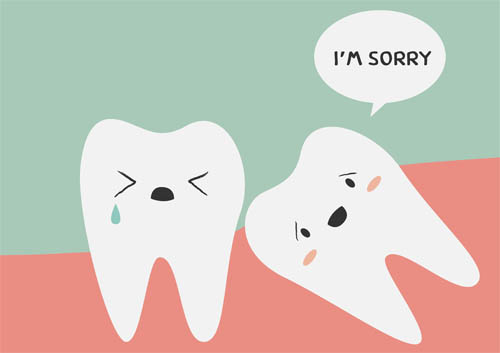November 14th, 2017

It’s common for children to suck their thumb at a young age. Dr. David Barney and our team want you to understand the potential issues that can surface down the road if the habit isn’t broken early on.
It’s normal for infants to explore the function of their mouths by putting objects like their thumbs inside it. You shouldn’t be concerned if your baby regularly sucks his or her thumb. For infants who are still growing their baby teeth, thumb sucking can help with stimulating growth and development of their baby teeth.
Thumb sucking is not a problem among infants because they generally do it to sooth and comfort themselves. Problems can occur of kids continue the habit when their baby teeth begin to fall out, around six years of age.
If you have a young child whose adult teeth are starting to come in, that’s when thumb sucking can start to be a problem. Most children stop thumb sucking between the ages of two and three years. According to the American Dental Association, if thumb sucking continues as adult teeth come in, this can lead to problems involving improper alignment of teeth and growth of the jaw, gums, and roof of the mouth.
It may also affect your child’s speech after that, by causing a lisp or other speech impediments. As a parent, you may need to begin to regulate and intervene if thumb sucking starts to become a bigger problem for your child.
How to Stop Thumb Sucking
- Provide comfort to your child if thumb sucking happens when he or she is anxious.
- Limit thumb sucking initially to bedtime or naptime.
- Employ positive reinforcement for good behavior.
- Talk with your child about the potential problems that come from this habit.
- Distract your son or daughter with activities such as fun games any time you notice it starting.
- Involve your little one in choosing methods for stopping, like positive rewards.
- Have Dr. David Barney talk to your child to reinforce concerns about thumb sucking.
Don’t forget that thumb sucking is a common habit that many children indulge in, and it should not be a concern right away. If you’re worried about your child’s thumb-sucking habit, start to address the issue as soon as possible.
The above techniques can help to reduce the amount of time your child sucks a thumb. Dr. David Barney and our team are here to help you if you have any questions or concerns about this habit.
Feel free to call our Beaverton, OR office and we will be happy to help you and your child.
November 7th, 2017

The wisdom teeth are the last of the permanent molars to emerge from the gums. This can occur as early as age 17 or as late as 21. Though some teens and young adults experience a completely normal tooth eruption with ideally aligned molars that pose no health threat, this is not the case for everyone.
According to the American Association of Oral and Maxillofacial Surgeons (AAOMS), wisdom teeth must meet specific criteria to avoid a required extraction. These guidelines include:
- Completely erupted and non-impacted
- Completely functional
- Painless
- Free of decay
- Disease-free
- Capable of being properly cleaned
If one or more of your child’s wisdom teeth do not meet these conditions, we recommend scheduling an appointment with Dr. David Barney; an extraction may be necessary.
Impacted wisdom teeth
One of the most common reasons for extracting a wisdom tooth is due to impaction. An impacted wisdom tooth is one that has not erupted and will not fully erupt from the gums. Usually this occurs because there is not enough room for the tooth to emerge. Impaction can be painful and can also lead to infection if left untreated. According to the AAOMS, roughly 90 percent of the teen and adult population has at least one impacted tooth. Extracting an impacted wisdom tooth early can help prevent future complications, such as periodontal disease, infections, and damage to neighboring teeth.
Extracting fully erupted wisdom teeth
Even if your child’s wisdom teeth are fully erupted, Dr. David Barney and our team at Barney Family Dental may recommend removing them as a preventive measure. Fully-erupted third molars often interfere with a healthy bite. This can lead to problems with tooth and jaw alignment and may also contribute to the development of headaches. Your child’s wisdom teeth may also be more prone to tooth decay and gum disease, because their location in the back of the mouth makes them more difficult to reach for brushing and flossing.
To learn more about wisdom teeth, or to schedule an appointment with Dr. David Barney, please give us a call at our convenient Beaverton, OR office!
October 31st, 2017

Did you know there are as many types of dental fillings as there are flavors of ice cream? Okay, maybe that’s an exaggeration. Still, when you visit the dentist with a cavity, there are many filling options. Most of us just sit in the chair, open our mouths, and let the dentist work his or her magic. But have you ever stopped to consider what the dentist is filling and restoring your decayed or broken tooth with?
Five types of dental fillings
There are five basic kinds of dental filing material. The dentist decides which type to use based on the degree of the decay, the cost of the material, and the type of dental insurance you have.
- Dental amalgam, or silver fillings, have been used to fill cavities for more than 150 years. Dental amalgam is the most common type of dental filling. It's strong, durable, and less expensive than other types.
- Composite fillings, or white fillings, are popular because the color matches the rest of your teeth. Composite fillings are a combination of resin and plastic. They are more aesthetically pleasing than silver fillings, but are also less durable.
- Ceramic fillings are durable and visually appealing (tooth-colored), but they are expensive. They are made of porcelain and have been shown to be resistant to staining.
- Glass ionomers are typically used on children whose teeth are still changing. Constructed from glass and acrylic, glass ionomers are designed to last fewer than five years. The benefit of these dental fillings is that they release fluoride, which protects the changing tooth from further decay.
- Unless you’re a rock or movie star, gold fillings aren’t common. While a gold filling is durable, non-corrosive, and can last more than 15 years, it not only takes more than one dental visit to place, but, as you can imagine, it is expensive.
For more information about fillings, or to schedule an appointment with Dr. David Barney, please give us a call at our convenient Beaverton, OR office!
October 24th, 2017

When your wisdom teeth start to emerge it can definitely be painful, but it can be even worse if your wisdom teeth become impacted. Impacted wisdom teeth are trying to erupt but are unable to do so because there is not sufficient room for them to emerge. This usually means that your wisdom teeth are painfully lodged in your jawbone.
While you may not see any real signs of the emerging wisdom teeth when they are impacted, what you can’t see can still definitely hurt you. Some of the indicators of impacted wisdom teeth are listed below.
- Jaw Pain: Pain in the back of your jaw is a common indicator of impacted wisdom teeth. The pain often concentrates in the area around your gums.
- Changes in the Mouth: You may notice some changes in your mouth when you have impacted wisdom teeth. Reddish gums, swelling in the jaw, bleeding gums, and bad breath can all be indicators that you are dealing with impacted wisdom teeth.
- Headaches: If you suddenly start having headaches, especially at the same time as some of the other issues mentioned above, they may indicate impacted wisdom teeth.
- Chewing Issues: Problems with chewing normally can indicate impacted wisdom teeth. If you are having trouble making the chewing motions because your mouth won’t quite open and close as easily as it used to, impacted wisdom teeth may be the culprit.
The Solution
If you are suffering from impacted wisdom teeth, the best solution is usually going to be removal. This is not a problem that will resolve naturally, and in fact, your pain and other symptoms may worsen as your wisdom teeth become increasingly impacted. At Barney Family Dental, Dr. David Barney can review the details of wisdom teeth removal surgery with you and help you determine if this is the best solution for your situation.





 Website Powered by Sesame 24-7™
Website Powered by Sesame 24-7™